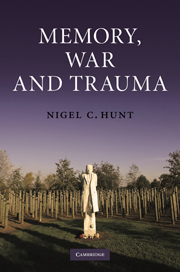Book contents
- Frontmatter
- Contents
- Preface
- 1 Background and purpose
- 2 Historical perspective
- 3 Methods and ethics
- 4 Current theory: post-traumatic stress disorder
- 5 Approaches to understanding trauma
- 6 Positive outcomes of traumatic experiences
- 7 Memory and history
- 8 Personal narrative and social discourse
- 9 Illustrating narrative as a scientific technique: the role of social support
- 10 Ageing, trauma and memory
- 11 Literature and trauma
- 12 Memorialisation and commemoration
- 13 Battlefield tours
- 14 Conclusions and future directions
- References
- Index
Preface
Published online by Cambridge University Press: 05 June 2012
- Frontmatter
- Contents
- Preface
- 1 Background and purpose
- 2 Historical perspective
- 3 Methods and ethics
- 4 Current theory: post-traumatic stress disorder
- 5 Approaches to understanding trauma
- 6 Positive outcomes of traumatic experiences
- 7 Memory and history
- 8 Personal narrative and social discourse
- 9 Illustrating narrative as a scientific technique: the role of social support
- 10 Ageing, trauma and memory
- 11 Literature and trauma
- 12 Memorialisation and commemoration
- 13 Battlefield tours
- 14 Conclusions and future directions
- References
- Index
Summary
I first became interested in the different ways people interpret war and the memory of war when I was a child, when I saw how my parents looked back on the Second World War with very different views. My father, who, in the RAF, was a participant throughout, tended to be neutral, not indifferent, but saw those 6 years with a mixture of positive, negative and inevitably fading memories; my mother, who was a child and adolescent, looked back with anger, seeing the war as a period which disrupted and destroyed her childhood; so I knew from an early age that people thought about the same events very differently.
This book is a culmination of my thinking over the last few years: from a recognition that much of what I was taught about memory as an undergraduate student was simplistic, focusing largely on a narrow individualistic view of memory as some kind of input–storage–output device which lacked explanatory value in terms of the way memory really works; to a growing recognition that in order to understand people and their thought processes psychologists such as myself should draw on the knowledge and understanding from other disciplines, such as history and sociology, in order to develop a fuller understanding of the ways in which people think. Furthermore, psychologists can learn as much, or more, from reading a good novel as from reading the scientific literature. A narrow disciplinary focus does not lead to good science, just restricted understanding.
- Type
- Chapter
- Information
- Memory, War and Trauma , pp. ix - xiiPublisher: Cambridge University PressPrint publication year: 2010



